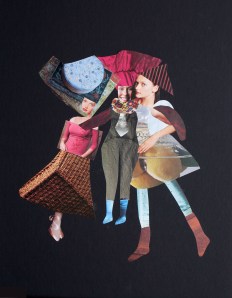(Art work on this blog is copyrighted.)
In a conversation with Rachel Amado Bortnick, she mentioned having tried to have a chat group there were technological problems, and was too hard to deal with.
Ah ha. If you are going to bring back and language, and you are having trouble doing so, the “not-working” places are where things are very rich. Those are the stuck places.
Clearly, speakers need to speak with each other. But more than that, speakers yearn to speak to each other.
So, there is something that could be done immediately to significantly boost the regular speaking of Ladino internationally.
What would that be? A regular radio show in which people can call in from anywhere and talk to the host or guests. Or just enjoy listening.
Blogtalk radio offers a very inexpensive online radio program for anyone who wants to start a radio show. There could be an international Sephardic radio show up and running in a few weeks.
And more, once it’s apparent that there can be such a show, there is no reason not to put it on many days a week and have those days be for different functions.
Here is a potential schedule:
Monday for three hours in the evening, Ladino speakers chat like crazy.
Tuesday for three hours, there would be a program to begin to encourage Sephardic communities around the world to listen and to use a little Ladino. It would be meant to make people comfortable and bit by bit to introduce some Ladino so hearing it becomes normal. Every communities could take turns being guests on the show (or hosting) and they could speak in English or French or Italian or whatever other language, about all that was happening in their community, letting others know what they doing and showing off a bit. A kind of Sephardic advertising. During part of those three hours, Sephardic music could be played and news of births and marriages, etc. would be announced but those announcement would be given in Ladino. Each of those posting would be encouraged to write their own very short announcement in Ladino (for which they could scramble to get help). Family members and synagogue members would be very proud to hear these formal announcement in Ladino. In addition, anyone in the community who wanted to send greetings or good wishes or get well wishes to their family and friends, either in town or elsehere, could do so on the radio if they did it in Ladino. It might be only a single sentence but it would be an achievement. This program would be meant to pull in each community and for them to enjoy hearing themselves on the radio and to see who had the guts to speak Ladino, even for 30 seconds. If a child or teen were going to read a sentence or more in Ladino, there is no question that aunts and uncles and grandparents and friends would be notified and listening eagerly for the child or teen’s big moment. Perhaps people would get a little certificate congratulating them on joining the community of those keeping Ladino alive.
Wednesday for there hours in the evening, there would be a beginning Ladino class. It might be run by Gloria Ascher or Mathilda Koen-Sarano or Rachael Amado Bortnick or any of the many young people who are studying Ladino now and would be willing to conduct a beginners class. The material for that class could be posted each week, days before the class, at this blog. All people would have to do is copy the lesson and just follow along. Perhaps some might be willing to speak a little if asked. This may be the first international language class in the world, all for Ladino
Thursday for three hours in the evening, there would be an intermediate Ladino class.
Friday for three hours would be for Ladino speakers to chat and enjoy the Sabbath together. (For the Orthodox, this wouldn’t work but for others, it would be a way to bring people together who have been lonely on the Sabbath and could use the regular connections.) This show might be mixed with music.
Saturday and Sunday might be filled with Sephardic speakers and stories and other entertainment, part in Ladino. This might be a good time for Ladino singers to actually teach Ladino songs, to children and to older people. Those who felt comfortable might sing on Tuesday nights, to show everyone what they had learned.
This schedule is only for three hours a day. With enough demand, it could offer more time.
The goal of Radio Ladino would be a Sephardic radio channel for everyone, with Ladino speakers having a wonderful time being together and Ladino itself increasingly present for those who have been disconnected from it. Needless to say, the meaning and joy and connections such a radio channel would bring older Sephardic Jews would be life-sustaining. Many may not be able to write to Ladino Komunitika but they could enjoy listening to the radio, and perhaps with help, call in to chat. Some would hear friends. It’s possible that some time might be devoted to those in Sephardic homes, choosing music they want, reaching out to be sure these homes in different countries are connected to each other. With enough demand, it could be a 24 hour show, playing Sephardic music or other recordings at night. This wold be especially kind to elderly Sephardics who are alone or home bound or in homes. It would provide a continuous community and familiarity.
The documentary, Saved by Language, (directed and produced by: Bryan Kirschen, Susanna Zaraysky, Elad Wexler) tells about Moris Albahari in Sarajevo and how Ladino saved his life during the Second World War. Mr. Albahari is almost alone in Sarajevo now. With a radio show in which he could be instantly connected to the entire Ladino-speaking community worldwdie, Ladino might save his life again.
Perhaps everyone is asking – who would run this? Who would pay for it?
Paying it simple. It costs almost nothing.
As for who would run it, there are Sephardic communities now with Ladino programs – Seattle, LA, New York, Paris, etc. One community could be in charge for a year or 6 months, ensuring the system is up and keeping it running so Rachel Amado Bortnick can focus on Ladino and forget technology. She and all the other speakers would have tremendous support and outreach. The main community for that year or 6 months would appoint students and synagogue members to host the different evenings (which in most cases would be little more than introducing the show in a warm way and putting on music the guests brought, for breaks for everyone. With people in the student and Sephardic community taking an evening (which they could share with friends), the task is easy but the rewards would be great.
If the Sephardic community if serious about protecting Ladino, this is where they can start. If they want to do something wonderful for their older family members, this would be it. The impact of such a channel on the Sephardic community as a whole would huge, not only in terms of Ladino but in terms of connections across the whole culture. The radio shows would create a powerful community.







